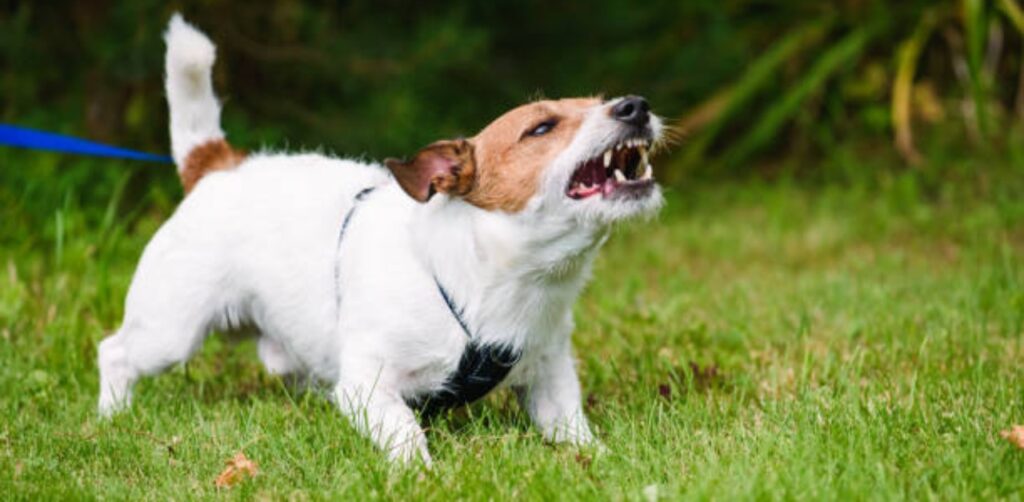We often hear of people describing their dogs as reactive, aggressive, or dominant. Behavioural labels are saying that the dog’s behaviour is a permanent trait. They prevent owners from understanding why their dog does certain things and then looking into the source and training that can support them in bringing change for them and their dog.
When you label your dog based on a particular behavioural element, you are inadvertently saying something is wrong with them. This kind of labelling can harm the relationship between the two of you. It can lead to a lack of trust between owners and their dogs, especially if the owner feels stuck and overwhelmed.
The labels – “anxious, aggressive, stressed out, over-excited” don’t matter; it is the context you use them and where you go from there.
Labels can be harmful to your dog.
The phrase “my dog can act aggressive in X circumstances” differs from “My dog is aggressive.” One is a situation, and the other is a life sentence.
It is worth noting that all dogs can use aggression, as do people and other social animals. It is a communication tool but does not have to be your dog’s lifelong label. Also, there are many layers to “aggressive” behaviour, and this is an extensive descriptive word – more on that later.
My best buddy Cooper, at 4 ½ years young, came into my life knowing how to make people move away with his mouth, and he was pretty good at it. He used the aggressive behaviour of biting to create space for himself, but for most of our time together, he was not acting aggressively. Giving him the label of being an aggressive dog was counterproductive to our situation.
In my situation when Cooper came into my life, I was new to dog training, and the idea of having an “aggressive dog” was overwhelming for me. It affected my social life – I was less inclined to invite people into my home, where Cooper’s aggressive tendencies were at their worst. It affected my confidence – I wasn’t sure where to begin with our training and our life moving forward, and I often wondered if I was over my head!
Labels don't help your dog learn.
We often time use these labels to justify the dog’s behaviour. They allow us to excuse ourselves from action, training and understanding. It’s easy to say, “my dog is over-excited, so they can’t go for walks in public,” or “My dog doesn’t like other dogs; that is the way they are.” These statements, like my own “cannot have people over,” do not help the situation or your relationship with your dog. They are more detrimental and can lead to resentment towards the dog.
Labels can make it easier for us not to bother because we believe something is wrong with them. This thought process leads down a slippery slope where our lack of action becomes justified by the label attached.
"It's not about what it is, it's about what it can become."
- Dr. Seuss
Behaviour is about context.
Understanding a dog’s personality from one or two behaviours is impossible. Terms like aggression are so broad that they can be misleading as a description of a dog’s behaviour. Understanding that your pet is not aggressive in all contexts is essential. It also does not mean that they cannot improve when we teach our dogs alternative behaviours, builds confidence levels, and changes how the dog reacts in those situations.
When assessing your dog’s behaviour, it is essential to remember that they are individuals and their histories (genetics, gestation experience, etc.), critical period socialisation exposure and training all contribute to their behaviour.
It is important not to label an individual animal’s behaviour as being aggressive and then assume that means they are dangerous (or even potentially violent) across all situations and contexts. This approach does not help us understand what we need to do about the situation in front of us!
What does aggressive behaviour mean? Aggressive displays include hard stares, growling, lunging, barking, snapping, and biting. Why is the dog acting in such a manner – is it over-excited, over-stimulated, fearful, or lacking confidence? Does the dog feel empowered by the learnt display of aggression, etc? Focusing on the source of the behaviour is the magic ticket; this is where real change can happen.
The light at the end of the tunnel.
It’s imperative to look at your dog’s behaviour in each specific situation rather than rely on a label for your dog as a fixed personality trait for their entire life.
Thanks to my amazing dog training mentors, growing experience, and education in dog training, Cooper is a different dog today and has more freedom than ever. He has earned it through our behaviour modification training.
He can still use aggressive displays of behaviour because of his early learning. Once a behaviour pattern is ingrained, and the dog sees value in it, there is always a risk that it will use it again. However, he now knows I have his back if he feels uncomfortable, and we will handle the situation.
You can help your dog learn better behaviours in many ways, but if you are unsure where to start or need further assistance, please reach out. Help is here; you do not need to go through this alone.

For dog obedience training and behaviour modification services in Geelong, the Bellarine,
Surf Coast and Golden Plains regions, contact King’s K9 Dog Training.

